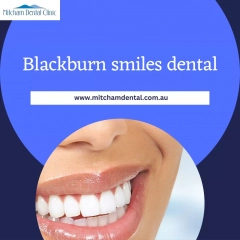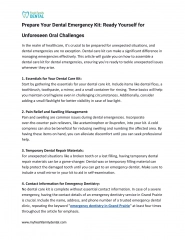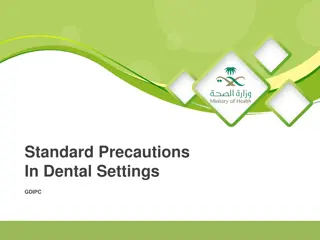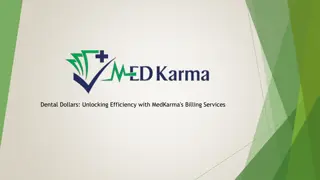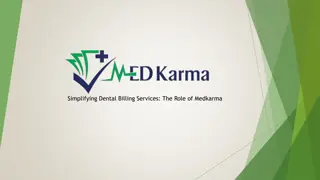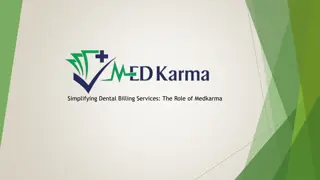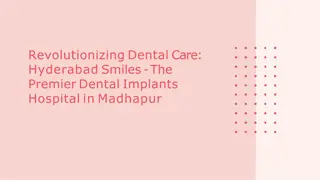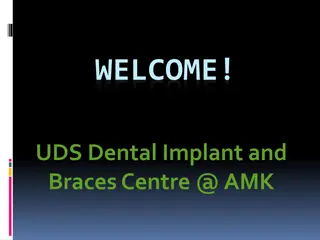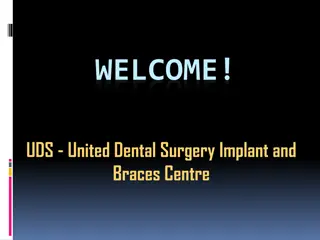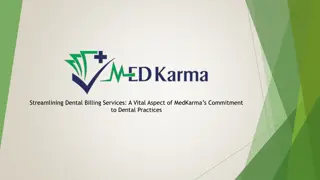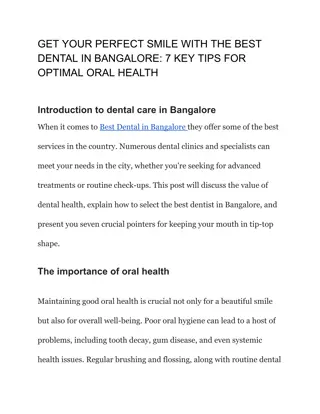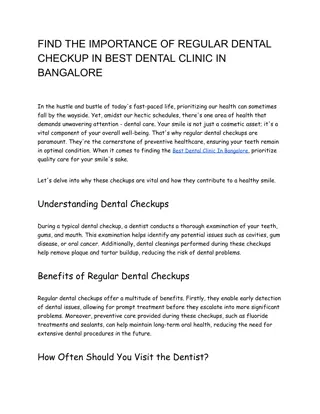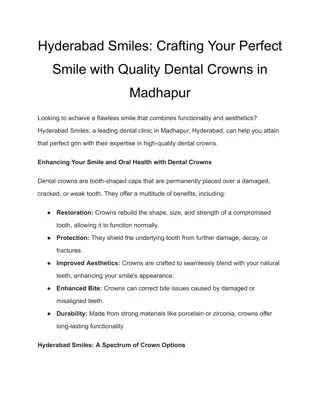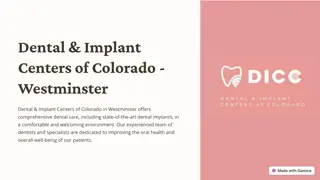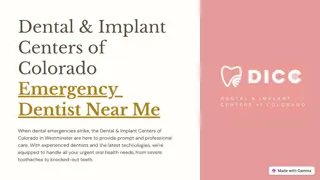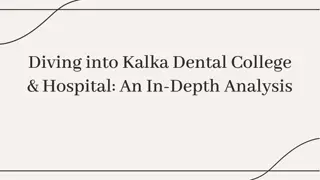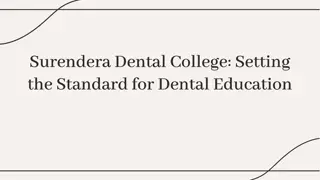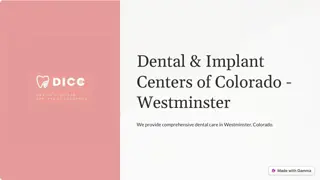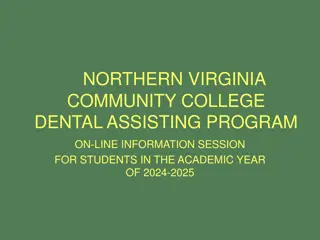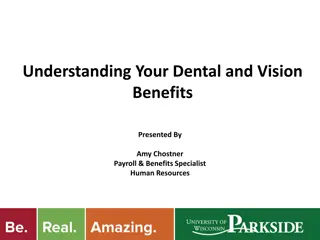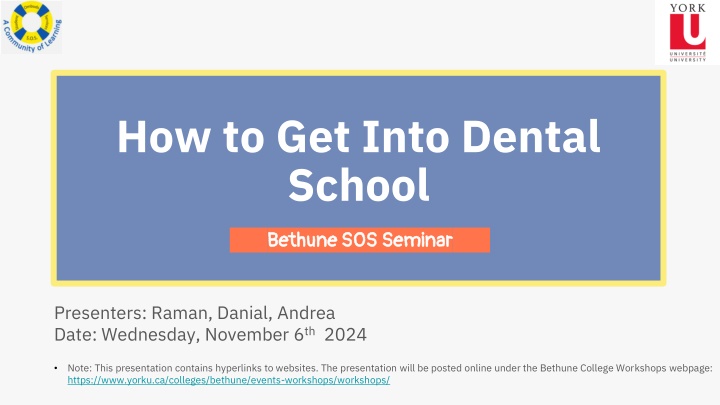
Get Into Dental School: Seminar Overview, Education, Costs, and Path to Practice
"Learn how to get into dental school at the Bethune SOS Seminar discussing education requirements, costs, and the route to dental practice. Topics include undergraduate studies, specialty options, residency, and tuition fees in Canada. Discover valuable insights and resources to kickstart your dental career."
Download Presentation

Please find below an Image/Link to download the presentation.
The content on the website is provided AS IS for your information and personal use only. It may not be sold, licensed, or shared on other websites without obtaining consent from the author. If you encounter any issues during the download, it is possible that the publisher has removed the file from their server.
You are allowed to download the files provided on this website for personal or commercial use, subject to the condition that they are used lawfully. All files are the property of their respective owners.
The content on the website is provided AS IS for your information and personal use only. It may not be sold, licensed, or shared on other websites without obtaining consent from the author.
E N D
Presentation Transcript
How to Get Into Dental School ___ ___Bethune SOS Seminar Bethune SOS Seminar___ ___ Presenters: Raman, Danial, Andrea Date: Wednesday, November 6th2024 Note: This presentation contains hyperlinks to websites. The presentation will be posted online under the Bethune College Workshops webpage: https://www.yorku.ca/colleges/bethune/events-workshops/workshops/
MEET OUR MENTORS Raman M.E. Danial S. Andrea K.
Overview Introduction Education & Fees Lifestyle What you need to get into Dental School Extra-curricular involvement Medical Aptitude Test (DAT) CASPer Interviews Canadian Dental Schools Summary Q&A
Disclaimer The information provided in this seminar gives some background information about the medical school application process. This is based on information provided by dental school websites. Any experiences given by the presenters or guest speaker may not reflect experiences shared by others. They are here to deliver the presentation, answer any questions, and provide support. We do our best to provide you the most updated information. Please ensure you obtain the latest information by conducting your own research.
Route to Practise Undergraduate Degree Post Undergrad? Masters? Gap Year? Write the DAT: Gain Admission into Dental School Write NDEB Licencing Exam Obtain Specialty? Practice Dentistry Open Clinic?
How Much Education Does it Take to Become a Doctor? Typically takes ~8 years Undergraduate studies Dental School Specializations/Residency* 2-4 years (you can apply without a degree to some schools) 4 years 2-4 years *Not required, unless you would like to specialize in fields including but not limited to periodontics, endodontics, oral and maxillofacial surgery, pediatric dentistry, dental public health etc Resources: https://nohofamilydental.com/blog/how-long-does-it-take-to-become-a-dentist/, https://ca.prepdoctors.com/how-to-become-a-dentist-in-canada-ndeb, https://www.dentistry.utoronto.ca/prospective-students/graduate/clinical-training#HowToApply
What is the cost of attending Dental School in Canada? From University of Toronto s Website: Domestic students: $45 000 per year x 4 years = $180 000 International students: $ 90 000 per year x 4 years = $360 000 These tuition fees include both academic , non-academic and dental instrument fees. Resources: https://www.dentistry.utoronto.ca/node/2264
What is the Lifestyle Like? Work hours vary between specialities Common to work 7-10 hours a day, + additional hours for dental emergencies
What Will You Need? Undergraduate Studies Extra-curricular involvement (to write about on Personal Statements, Autobiographical Sketches, etc ) Dental Aptitude Test (DAT) CASPer Interviews
Extra-curricular Involvement Research Positions RAY (Research @ York) Work-study positions with professors Research at other universities Volunteer Opportunities Volunteering at Dental Clinics Joining Clubs and Organizations at York Community Involvement Leadership Positions Executive member on clubs/organizations Sports and Hobbies Varsity, intramurals
Autobiographical Sketch/Personal Statement Different schools require different written components as part of their application package These components are typically autobiographical sketches, personal statements or open-ended questions for applicants to answer They allow applicants to tell schools more about themselves, why dentistry, what singles them out from any other applicant, etc Some general tips include: Avoid vague writing, always include examples Check your spelling and grammar before submitting Have someone else look at your answers to give you feedback Use resources at York, such as the Bethune Writing Centre for help! For more information on how excel on written components feel free to refer to our past slide deck on Crafting Professional School Applications.
Dental School Application System Canadian Schools often have different application systems: 1. AADSAS: ADEA Associated American Dental Schools Application Service o Not all schools will use this, for example, UofT does! 2. School-specific Application Services: to find these search up the School Name + Dental School Application System o UofT: University of Toronto Dental Application Service o Western: OUAC o Dalhousie: Dalhousie Application Portal o McGill: McGill Application Portal DEADLINES (For Current 2024-2025 Cycle): vary by school!
Dental Aptitude Test (DAT) - Overview Standardized exam, conducted by the Canadian Dental Association (CDA) Required for admission by all Canadian schools (except for McGill) Note there are American and Canadian (English and French) versions, we will be focusing on the Canadian (English) version Computer-based exam (no calculator) + Manual Dexterity Test 210 Multiple Choice Questions 3 hours and 50 minutes (4 hour and 15 minute appointment time slot) A single 15 minute break is offered after the first section of the test. Other unscheduled breaks will eat up your test time Tests knowledge in these 3 sections 1. Survey of the Natural Sciences - Biology and General Chemistry (SNS) 2. Perceptual Ability Test (PAT) 3. Reading Comprehension Test (RCT) From: https://www.cda-adc.ca/_files/becoming/dat/documents/DAT_Candidate_Guide.pdf
Manual Dexterity Test Has been suspended since COVID-19. Carving a piece of soap according to exact specifications. From: https://www.cda-adc.ca/_files/becoming/dat/documents/DAT_Candidate_Guide.pdf
Dental Aptitude Test (DAT) Sections Breakdown Section Natural Sciences Duration and Questions 60 minutes 40 Biology Questions 30 Gen. Chemistry Questions Sample Topics/Structure - Cell Metabolism - Genetics - Atomic and Molecular Structure - BIOL2020/2021 + CHEM1000/1001 - Angle Discrimination - 3D Form Development - Apertures - Paper Folding - No prior knowledge required - 3 passages - Carve a given model out of soap - Currently suspended! Perceptual Ability 60 minutes 90 Questions Reading Comprehension Manual Dexterity 60 minutes 50 Questions 30 Minutes From: https://www.cda-adc.ca/en/becoming/dat/faqs/ and https://www.cda-adc.ca/_files/becoming/dat/documents/DAT_Candidate_Guide.pdf
DAT Scoring DAT Scores are reported as an Academic Average (AA) Rounded average of your score in Natural Sciences and Reading Comprehension Reported as a score from 1-30, representing a percentile Distributions vary slightly by year DAT Score (AA) 17-18 Percentile Qualitative Score Average 50 19-20 75 Good 22-23 98 Very High
DAT - Fees Fee Type Description Fee Amount FEES COLLECTED DURING REGISTRATION, SUBJECT TO APPLICABLE TAXES: DAT Test Fee - Official Student Transcript 5 Official Transcripts to Schools DAT Preparation Manual Test Administation $552 - - Preparation Materials $30 Transcripts Transcripts after 5 Schools $20 per each additional transcript FEES COLLECTED SEPARATELY FROM REGISTRATION: DAT results audit (optional) Refunds Within 30 days of writing, you may request an audit of your results 1-30 days since DAT fees paid 31-90 days since DAT fees paid $80 $150 $250 From: https://www.cda-adc.ca/_files/becoming/dat/documents/DAT_Candidate_Guide.pdf
DAT - FAQ Where can I register? Register via the DAT website: cda-adc.ca/dat Don t wait until the last minute! Check with schools on when they need your scores. When do I register? The CDA recommends to register 6-8 months before schools need your scores. Write the test at least 8 weeks before you need you scores. How much does it cost to write the DAT? $552 CAD (test administration, official student transcript, up to 5 official transcripts sent to dental schools you select at registration) + additional fees + school specific fees How many times can I write the DAT? The MCAT can be written an unlimited number of times. For multiple DAT attempts there are certain restrictions: You must wait at least 60 days from your last attempt before retaking. If you are retesting after 3 or more times, you must provide evidence of previous applications to dental schools and you can only retest once per 12-month period How long does it take to get my score? ~1 month following your test date Can you void the exam like the MCAT? No, scores cannot be voided by yourself.
DAT Resources Getting Started Social Media (YouTube, blogs, Reddit)* Tons of people share their experiences, check out some videos/blogs r/DAT (Reddit) has many links to legitimate free resources, Anki decks, mnemonics, and study plan spreadsheets CDA Website Carefully reach all information they have online and use their practice materials. Note their practice tests are for purchase only. Friends, peers and mentors! Reach out to anyone you know who has the written the DAT for advice! Content Review and Practice Questions Khan Academy, Jack Westin YouTube videos Exam prep books, Preparation Courses (DATBooster, DAT Destroyer Flash cards (Anki decks, quizlet, etc ) CDA Practice * Be mindful that some people are breaking their DAT agreement on these sites!
Computer-based Assessment for Sampling Personal Characteristics - CASPer Online, scenario-based test assessing non-academic qualities like empathy, ethics, and decision-making. What would you do in a tough situation? What are your behavioural tendencies? Schools Requiring CASPer: UofT, Western, McGill, Alberta, Saskatchewan Format 12 scenarios (video or word-based prompts) 3 open-ended questions each (5 mins/section) 10 minute break hallway through test Preparation Tips: Practice responding to ethical dilemmas. Stay calm under time pressure. Focus on empathy, ethical reasoning, and clarity in responses. Try to understand multiple perspectives in every scenario. Practice typing!
CASPer Example Prompt: COVID-19 is an infectious disease that has quickly taken over our world. Many people feel that we will not be able to return to our normal lives until a vaccine is developed. It is likely that when the vaccine is developed, there will not be enough vaccines for everyone to receive it right away. Questions 1. How should priority be determined for the COVID-19 vaccine? 2. What are the ethical concerns to consider in any priority or ranking system? 3. Discuss a time where you had to choose one person over another in a personal situation and how you came to your decisions. From: https://www.caspertest.com/casper-sample-questions/#sample-question-card-7
Canadian (English) Dental Schools University of Toronto University of Western Ontario University of Alberta University of British Columbia University of Manitoba University of Saskatchewan Dalhousie University (Nova Scotia) McGill University (Quebec)
Prerequisites West Canada School Prerequisites Alberta Min C- in: Cell Biology (1), Microbiology (1), General Chemistry (1), Organic Chemistry (1), Biochemistry (1), English (2), Statistics (1), Human Physiology (2) 3.5 GPA cutoff DAT, CASPer Min C- in: Biology (2), Chemistry (2), Biochemistry (2), Organic Chemistry (2), English (2) 2.8 GPA cutoff DAT Biology (2), Chemistry (2), Physics (2), Organic Chemistry (2), English (2), Biochemistry (2), Humanities/Social Science (2) 3.85 GPA cutoff DAT Biology (2), Chemistry (1), Organic Chemistry (1), Physics (1), Biochemistry (1), Metabolic Biochemistry (1), Physiology (2), Nutrition (1), Microbiology (1), Social Sciences/Humanities (2) UBC Manitoba Saskatchewan From: https://sssc.carleton.ca/resources-health-care-resources/dental-school-information
Prerequisites East Canada School Prerequisites Dalhousie Biology (2), Chemistry (2), Physics (2), Organic Chemistry (2), Biochemistry (1), Microbiology (1), Human Physiology (2), English (2), Humanities/Social Sciences (4) DAT 3.7/4.3 GPA cutoff Biochemistry (2), Human/Mammalian Physiology (2), Life Sciences (4), Humanities/Social Sciences (2) 3.0 GPA cutoff DAT, CASPer Organic Chemistry (1), Biochemistry (1), Humanities/Mammalian Physiology (2) 3.7 GPA cutoff DAT, CASPer Biology (2), Chemistry (2), Physics (2), Organic Chemistry (1), Recommended: (1) in Biochemistry, Mammalian Physiology, Cell Biology & Metabolism DAT, CASPer Toronto Western McGill From: https://sssc.carleton.ca/resources-health-care-resources/dental-school-information
University of Toronto Academic Requirements Minimum of 3 years of undergraduate work Biochemistry 2 semesters Human/Animal Physiology 2 semesters Life Sciences (biology based courses) 4 semesters Humanities/Social Sciences 2 semesters GPA cutoff: 3.0/4.0 Average accepted GPA 3.95 (2024), admitted students usually have a minimum GPA of 3.85 DAT average: 23 CASPer From: https://www.dentistry.utoronto.ca/prospective-students/undergraduate/DDS, https://dat-prep.com/dat-scores-for-dental- schools.php?srsltid=AfmBOopPAu6n2emwLtPS_Y-u0W9nd9ZraNuO3pqq6uKyrHZx0XrApfbP
University of Toronto Non-Academic Requirements Personal Statement Explain why you want to pursue a dental career (maximum 2 pages) Greatest Accomplishment Outline what you consider to be your greatest accomplishment and the reasons you have chosen to highlight it (maximum 1 page) ** There are no specific format requirements for supporting information From: https://forms2.dentistry.utoronto.ca/201055113968048
Western Academic Requirements 4 year undergraduate degree Organic Chemistry 1 semester Biochemistry 1 semester Human/Mammalian Physiology 2 semesters You may be asked to complete a Physiology Challenge Exam if you apply without this course GPA cutoff: 80% or higher in the best 2 academic years Calculated from the 2 best years with full course load At least 30 credit hours completed Sept-April = full course load At least 18 credit hours whose level is at or above the year of study A maximum of 6 pass/fail credit hours permitted per year Summer Courses will not be counted DAT average: 21 CASPer From: https://www.schulich.uwo.ca/med_dent_admissions/dentistry/admission_requirements.html, https://dat-prep.com/dat-scores-for-dental- schools.php?srsltid=AfmBOopPAu6n2emwLtPS_Y-u0W9nd9ZraNuO3pqq6uKyrHZx0XrApfbP
Western Non-Academic Requirements Western Autobiographical Sketch & Personal Statement Invites applicants to tell their story and share what makes them unique by linking activities/experiences. Schulich Dentistry is interested in how their activities/experiences connect with the following topics: Teamwork and Leadership Respect for Equity, Diversity, and Inclusion Social Accountability and Social Responsibility Self-directed Learning, Problem-solving and Critical Inquiry From: https://www.schulich.uwo.ca/med_dent_admissions/dentistry/admission_requirements.html
Application Deadlines Will vary from school to school! Many school s deadlines are in November! UofT: Nov 1 Western: Nov 11 Dalhousie: May 1 (strongly recommended to apply before Feb 1)
Interviews You are almost there! 50% of interviewees are accepted Purpose: evaluate maturity, motivation, initiative, communication, personal qualities, and social skills Possible formats: MMI: multiple stations (10 minutes each) with different scenarios given some time to prepare UofT 3 stations total Traditional Panel Interview Western 30 minute duration, 3 panelists (Faulty Member, Community Member, Current Student)
Interview Preparation Before: During After Know your application Practice common questions Plan your trip carefully Dress comfortable yet professional Positive body language Listen intently Articulate well Be honest, sincere and true to yourself Reflect briefly Thank everyone who helped Continue Communication
Summary There are several medical schools in Canada, and even more in the United States Admissions requirements differ slightly from school to school but generally include GPA (min 80%) Courses in Biology, Biochemistry, Organic Chemistry, Humanities DAT CASPer Always check requirements online as they change year-to-year Meeting minimum requirements does not guarantee admission
Upcoming Seminars + Slides Access Nov 13 5:30 pm BC320 and Zoom Study Tips for Exams Oct 20 5:30 pm BC203 and Zoom Make your Degree International Jan 8 5:30 pm BC320 and Zoom Finding Research and Volunteer Opportunities Career Paths in Math Jan 15 5:30 pm BC320 and Zoom
Sormeh Mehrabi 2nd Year Dental Student at Dalhousie York Biomedical Science Alum Background: My family and I moved from Iran to Canada in 2010 for better opportunities. Observing the transformative care my parents received from dentists inspired me to pursue dentistry Favourite York Courses: Persian Literature Hobbies: Cooking and Arts + Crafts! Why Dentistry? I ve always loved art, working with my hands and helping people. Watching dentists mentor me and treat my parents showed me the impact I could have in this field. Key piece of advice for undergraduate students: embrace your uniqueness and always practice being grateful Fun Fact: Sormeh has a diastema
Sormehs Application Journey Application to Australian dental school after high school: no acceptance Attended York for its flexibility. o Joined clubs, got involved in research. o Founded Bright Future Dentists Retook DAT, achieving 19 AA with a 3.85 GPA and 4thquartile CASPer score. Applied to US schools, UofT and Dalhousie Drawn to Dalhousie for small class sizes and hands-on clinical experience. Founded Luminary A platform to provide the mentorship and support she wished she had. Built on experiences with Bright Future Dentists, Luminary aims to help future healthcare professionals succeed.
What is one thing you wish someone had told you before starting Dental School?
When should I start applying to Dental School?
What should I get involved in? Are there any extracurriculars that will boost my application?
Im worried about my GPA not being high enough. Do I have a shot at getting into Dental School? What can I do?
How would you go about answering this question from earlier: Should a doctor's primary aim be to change behavior to prevent disease or treat existing disease? What are your thoughts on upstream and downstream care?
HAVE ANY QUESTIONS? Ask away OR Send us an email: BCMENTOR@YORKU.CA Visit: bethune.yorku.ca

